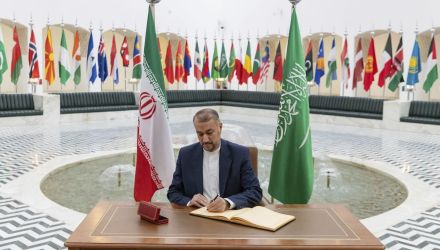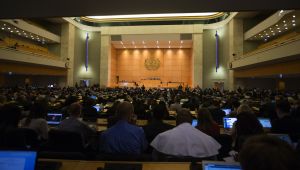The latest International Atomic Energy Agency (IAEA) report on Iran's nuclear program is circulating in Vienna among governments, but has not yet been released officially. Media reports have highlighted Iran's conflict with inspectors, but other developments are more troubling. While couched in the calm tones of international civil servants, the report's message is unmistakable: Iran continues its steady march towards nuclear weapon capabilities, and no recent progress has been made in halting it.
Since the current U.S. administration took office, extending its hand to the leaders in Tehran, Iran has: continued to violate a series of U.N. Security Council Resolutions, now numbering six; increased its declared capacity to enrich uranium by about one-third -- despite U.N. Security Council Resolutions requiring that it halt enrichment; nearly tripled its stocks of low-enriched uranium; begun production of small quantities of uranium enriched to 20 percent, versus earlier production at 3.5 percent; revealed a secret, underground enrichment facility near Qom, while announcing plans for several more; and continued to chip away at the IAEA's ability to monitor nuclear developments.
Against this string of successes for Tehran, those trying to curtail an Iranian bomb have met little joy. The IAEA has been unable to pry from Iran additional information about the once-secret Qom facility. The Agency's requests for more information about Iran's announcements earlier this year that it possessed laser enrichment and more advanced centrifuge technologies are unmet. Iran denied IAEA inspectors access to its heavy water production plant. Iran remains, in the words of the IAEA report, "the only State with significant nuclear activities which has a comprehensive safeguards agreement in force" that refuses to comply with a Code requiring early notification of plans to construct or modify major nuclear facilities. Most troubling, Iran continues to stonewall the IAEA's attempts to resolve questions regarding the possible existence of military-related nuclear work, "including activities related to development of a nuclear payload for a missile."
Perhaps equally troubling are signs that Iran may be impeding the IAEA's ability to verify safeguards on uranium enrichment, a path to achieving nuclear weapons capability. The IAEA physically inventories material at Iran's declared enrichment facility once a year, with the last check on November 22, 2009. Between inventories, production levels can be calculated using operations data, but because of accounting problems, at present, "the Agency cannot confirm the nuclear material balance." The Agency report offers assurance that the material is subject to containment and surveillance, but then cites "a number of incidents involving the breaking of seals by the operator" of the enrichment plant. The amount of material that Iran could divert through such actions would be small. But these incidents might be part of a strategy to test the limits of international vigilance and patience, and to create a climate of ambiguity and uncertainty. One thing is certain: several IAEA seals do not break spontaneously.
What of the effort to impose sanctions to force Iran to reverse course? On June 9, 2010, after months of tedious negotiation, the Security Council adopted another resolution, which broadened both sanctions and the list of individuals and organizations to which they apply. Nonetheless, Secretary Clinton's promise of "crippling sanctions" was effectively blocked by Russia and China, regardless of follow-on measures imposed by the United States and Europe. Moscow and Beijing successfully insisted that any sanctions must be targeted at those responsible for the nuclear program, e.g. the Islamic Revolutionary Guard Corps, and not hurt the Iranian people.
Such a strategy sounds reasonable, but in reality, inverts an effective sanctions regime. The Revolutionary Guard, with its own independent industrial base, is both tough and well insulated from financial sanctions. They are committed militants with the ability to use state resources to defend themselves. Moreover, given that they have watched their colleagues die in military plane crashes because decades of sanctions made spare aircraft parts impossible to obtain, limiting their ability to travel to Europe or their access to international banks seems unlikely to tip the balance against the nuclear program.
Rather than targeting the hardcore, sanctions should induce new players to join the debate over Iran's nuclear program, e.g. businessmen who might otherwise be indifferent to the issue. Broad, influential groups inside Iran must be made to feel the costs of its nuclear program. If the debate over whether or not to continue the current nuclear program remains among the mullahs and the Revolutionary Guard, the conclusion is foregone.
Meanwhile, the debate in the West over Iran has devolved into a sterile discussion of which would be more disastrous -- a military attack on Iran or nuclear-armed mullahs. Absent some sort of external shock, the Iranian nuclear program will continue to churn out more enriched uranium, construct a bigger, more capable nuclear infrastructure, and offer more ambiguities that the IAEA will find impossible to resolve.
President Obama was right in Prague: "Rules must be binding. Violations must be punished. Words must mean something." Most importantly, "the world must stand together to prevent the spread of nuclear weapons." Confronted with another IAEA report detailing Iran's violations of its international obligations, the United States must again attempt to rally international support for effective action, and to provoke a real debate both in Tehran and among its allies over its nuclear program.
This will test the value of the Russian reset. Some Russians privately note that Iran is not a high priority for Moscow, but is for Washington, and that the difference will have to be paid for, if real action is to be taken. The administration has staked much on the reset with Russia -- now is the time to see whether that bet was a wise one.
As Iran marches towards nuclear capability, further delay will only narrow our options to a choice between the unacceptable and the unthinkable.
Tobey, William. “Avoiding a lose-lose situation with Iran.” Foreign Policy, September 9, 2010




